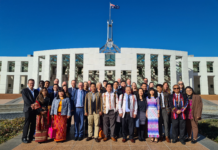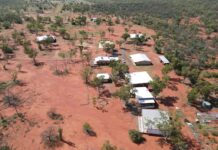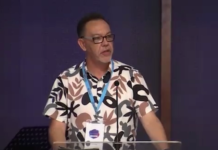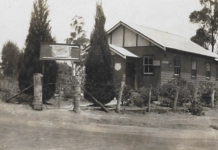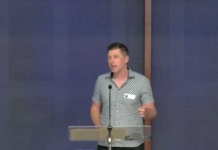by Jamie Long – Lead Pastor of Wyong Baptist Church
Does your Pastor need fresh vision and energy in their life and ministry? Perhaps what they need is a Sabbatical. In Leviticus 25 the Lord instructs the Israelites to rest their fields in the seventh year so that ongoing fruitfulness could be maintained. The practice of taking a Sabbatical is one of a number of ways this principle of ‘special rest’ can be applied to our lives and ministries.
There are various versions of Sabbatical out there. In the academic world Sabbaticals are common place and often involve research, writing or other academic pursuits. Pastors going on Sabbatical has not been as common at least in Baptist Churches in NSW & ACT. As I considered the possibility myself, I explored the validity and practicalities of taking a Sabbatical as a Pastoral leader. As I researched I found there were various ways of thinking about Sabbaticals for Pastors. Some use the time to do some study or to write. Others research particular topics. I know pastors who have organised a pulpit exchange in another state or country while others have gone on some form of pilgrimage. All involved rest. The duration of Sabbatical leave seems to vary from around a month to more like three months (more than three months would be difficult in most settings unless the pastor was changing ministries). I came to the conclusion that, as with most things, one size does not fit all. That being said, I suggest that there are some principles that can help add value to any Sabbatical leave.
- Have a purpose. A Sabbatical without a sense of purpose is just a holiday. My Sabbatical had plenty of fun but behind it all were three clear purposes. A) I was entering my 7th year as Lead Pastor of Wyong Baptist and I wanted to step back and ask God “what next?” both for the church and for me. B) I knew that I was getting weary in ministry. I was not “burnt out” nor did I want to become so. I felt a rest would be beneficial for me and the church. C) Both my wife Kirsten and I felt that our family (we have 4 kids who were aged 8 -16) was at a stage where there could be some great benefits from doing a big trip together. So as we prayed and asked people to pray we focused on these three areas. For others the purpose of the time will be different. The important thing is to prayerfully find clarity about what the Sabbatical is about.
- Take time to plan. More than 12 months before our leave I wrote up a plan for a “dream Sabbatical.” As we prayed and worked through it, the plan changed considerably but the dream was our starting point. I also began talking with our Church leadership about the possibilities many months before hand. At least 6 months before we wanted our leave we discussed it at a church meeting. Our church encouraged us and affirmed the idea. Good planning was important both for us and for the church.
- Consult and get help. Consulting with those you work with and others who might help you can add great value to a Sabbatical time. I consulted with our Church Elders and then with a Spiritual Director and Ministry Mentor. These people helped me ask the right questions to begin with, then, toward the end of my leave, they helped me unpack my experiences.
- Three helpful Stages. It seems that many Pastoral Sabbaticals have three distinct periods or stages. Stage one– just rest. I spent the first two weeks of my Sabbatical just hanging around home. I got Gout (I note Spurgeon got Gout so it’s very Baptist!) so I had to stay in bed for some days but that was Ok because the plan was to rest anyway. Stage two- do something. For some it’s study or writing or a pulpit exchange or some kind of pilgrimage. For most it involves some kind of travel. For me it involved a big family trip overseas with lots of family time, some visiting Churches and Pastors in the UK and a couple of weeks of doing a Summer school class at Regent College in Vancouver. All that time we were asking ‘what is God saying to us in these experiences?’ Stage three-reengagement. I took three weeks after our trip to prepare to reengage with ministry at home. The first two stages of our Sabbatical we deliberately had little contact with our home church. In this third stage I deliberately began to reengage. We had dinner with a few people from church and some of our team visited other churches with me. I felt God used this time to help me clarify where he wanted me to lead as I returned. By the time I finished Sabbatical I was ready to be back. I cannot emphasise enough how important I found this final stage in helping me get to a place where I was ready for ministry again.
- Be willing to bare a cost. You will have surmised that our Sabbatical was not cheap. For us it was a major investment. In addition, most churches are not in a position to grant their pastors 12 weeks Sabbatical leave. Wyong Baptist generously provided 3 weeks Sabbatical leave and we took some Long Service Leave and some holiday leave. I cannot think of a better way of using LSL. Our family saw this a very worthwhile investment. Not every Sabbatical needs to be so long (I know people who have had very effective 6 week Sabbaticals) or so costly, but whatever it looks like you can be sure that it will have a cost.
- Church Cost and Benefit. Churches pay a cost in this too. In our case we have a good team who were able to step up in my absence and my LSL helped pay for some great guest speakers. In some churches the cost might be greater. However there are some great benefits. Some in our leadership team benefited from the experience of stepping up to extra responsibility in my absence and there are some healthy positives for a church to have a little while without it’s Senior Pastor. Aside from this, there is no doubt that I returned to the Church with greater energy and with a broader perspective. There are some things you can only see if you step out of your own situation for a while.
- Pray. We knew that for our Sabbatical to really achieve what we hoped, God would have to be in every step. We looked for him before, during and after our leave. We ask the church to be praying for us and for themselves. Just as we were asking ‘what is God saying to us,’ we encouraged the church to be asking what God might be saying in our absence. This is always a little uncomfortable and it did cross our minds that the Lord might say (to us or the church) that it was time to leave. I know others for whom that has been the case. In our situation however, this is not the message we (or the Church) got. Over all we felt incredibly blessed through our Sabbatical leave and God answered our prayers in so many wonderful ways.
You might well ask ‘is it only pastors who need a Sabbatical?’ No, we can all benefit from building in some form of Sabbatical into our lives. However, as we consider how we promote healthier churches and healthier pastors, this practice should be considered as one option that could aid the Spiritual and emotional health of our Pastors and assist them in maintaining energy and freshness in their ministries with us.


















